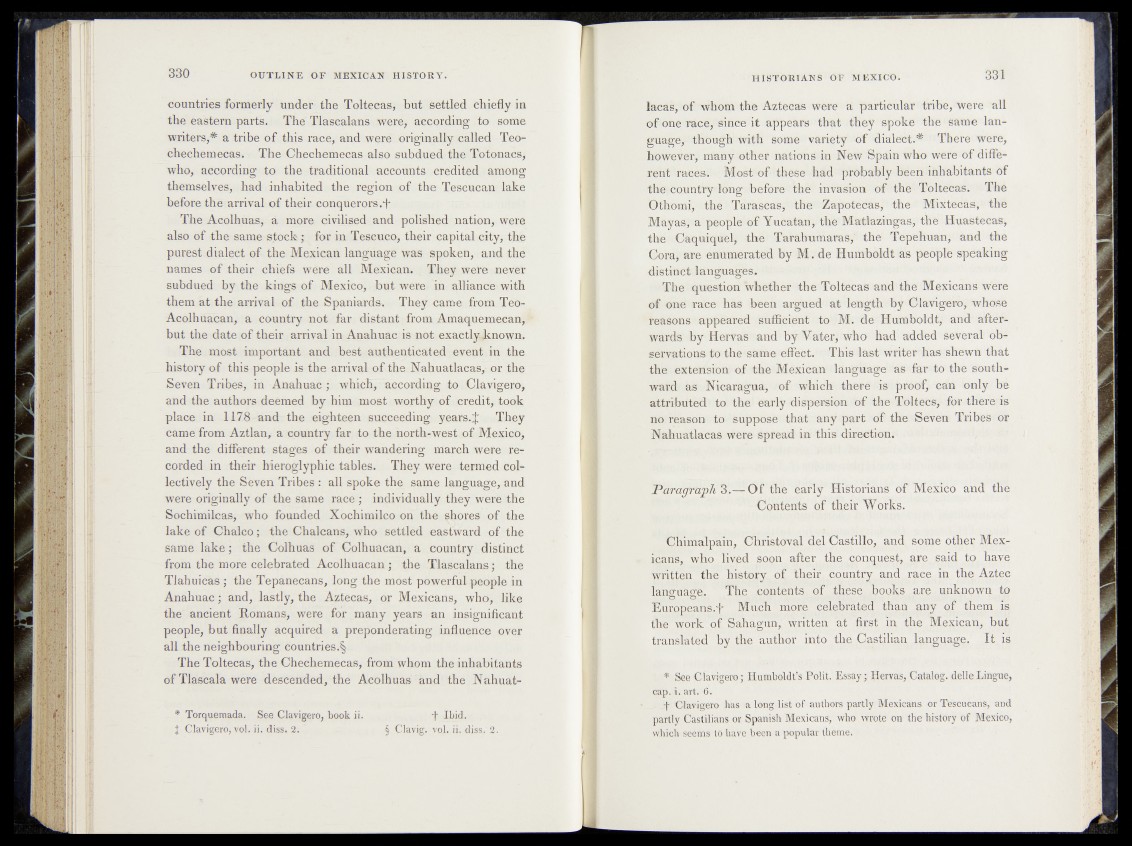
countries formerly under the Toltecas* but settled Chiefly in
the eastern parts. The ©asimlans were, according;!© some
writers,* a tribe of this race, and were' originally called Teo-
chechemecas. - The Chechemecns also subdued the Totonac%
who, according to the traditional accounts; credited among
themselves, had inhabited the region of the Tescucan lake
before the?arrival of their conquerors.^
The Acolhuas, a more civilised and polished nation, were
also of the same stock; for in Tescuca, their capital city, the
purest dialect of the Mexican language was spoken, and the
names of their chiefs were all Mexican. They were never
subdued by the kings of Mexico, but Wem in aUiance-with
them at the arrival of the Spaniards-. •. They came from Ted*
Acolhiiacan, a country mot far distant from Amaquemecan;!
but the date of their arrival in Anahuac is not exactl^jknown.
The most important and best authenticated;; event, in the
history of this people is the arrival of the ISTahuatlacas,- or the
Seven Tribes, in Anahuac; which, according to r Clavigero;
and the authors deemed by him most worthy of credit, took
place in 1178 and the eighteen succeeding years.^; They
came from Aztlan, a country far to the north-west of Mexico,
and the different stages of their wandering march were ret
corded in their hieroglyphic tables. They were termed collectively
the Seven Tribes: all spoke the same language, and
were originally of the same race ; individually they were the
Sochimilcas, who founded Xochimilco on the shores of the
lake of Chaleo; the Chalcans, who settled eastward of the
same lake; the Colhuas of Colhuaean, a country distinct
from the more celebrated Acolhuacan; the Tlascalans; the
Tlahuicas; the Tepanecans, long the most powerful people in
Anahuac; and, lastly, the Aztecas, or Mexicans, who, like
the ancient Romans, were for many years an insignificant
people, but finally acquired a preponderating influence over
all the neighbouring countries.§
The Toltecas, the Chechemecas, from whom the inhabitants
of Tlascala were descended, the Acolhuas and the Nahuat-
Torquemada. See Clavigero, book ii.
Clavigero, vol. ii. diss, 2.
+ Ibid.
§ Clavig. vol. ii, diss. 2,
lacas, of whom the Aztecas were a particular tribe, were all
of one race, siÉüSit appears that they #poke the same language,
-though with some variety Of dialect.* There were,
ki#e^iiy many other nations -io -Mew Spain who were of different
races. Most'of1* these had probably been inhabitants of
the- country-dong - before the 'invasion1 of-the Toltecas. The
Othorni, the Tarascas, the Zapotecas, the Mixteoàs,: the
Mayas,- a people of MîÉlaàïngas, the Huastecas,
the Caquiquel, the Tarahumaras/' the Tepehuan; and the
(So’ré; are enumerated by M. de Humboldt ais people speaking
distinct languages. &
The question whether the Toltecas and the Mexicans were
of one race; has been argued at le®gth by 01avigero5 whose
'feaâons i appeared sufficient to M. de Humboldt, and afterwards
by Remis and by Vater, who had addfed "several' observations
to thesame-effect. This last writerfhas shewn that
the extension of the Mexican language as far' to the southward
as Nicaragua, ;©f which there is proof, caft only be
attributed to the early dispersion of the Toitecsyfbr thereis
no reason to suppose that any part of the Seven Tribes or
Nahuatlacas were spread in this direction.
"Paragraph 3.— Of the early Historians of Mexico and the
Contents of their Works.
Chimalpain, Christoval del Castillo, and Jsome other Mexicans,
who lived soon after the^pnqijg|k.4§.re) saM.to jfrave-
written the history , of the^ country and ra cein the Azt.ec
language. The' contents of these^Bopks .are unknown to
Eurppeans.f Much more celebrated than any of them Is
the Work of Bahaguii, written at fihst .in the Mexican, but;
translated by the author into the ^astilian^kngpage. It i|
* See Clavigeto; Humboldt’s Polit.; Essay; H-ervas, Catalog, delle Lingue,
cap. i. art. 6.
Jf Clavigero has a long list of authors partly Mexicans or Tescacans, and
partly Castilians or Spanish Tdexicansj'. vtfhê' -wrotè on the history of Mexico,
which seems tö have been a popular theme.